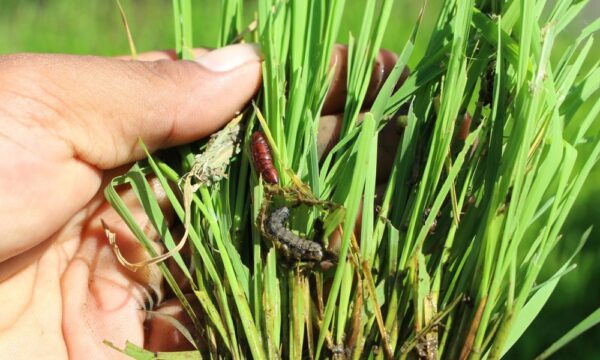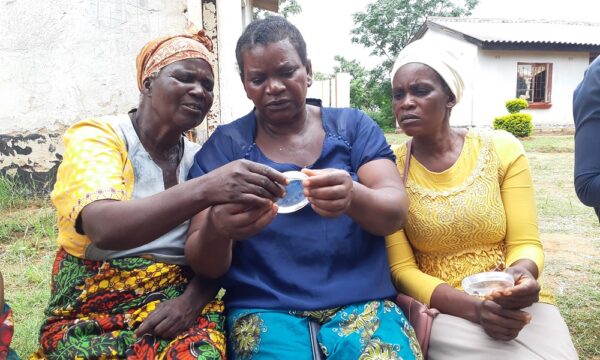
A new weapon in the fight against the fall armyworm caterpillar in Kenya is being launched giving thousands of smallholder farmers free expert help and advice on how to tackle the devastating pest through mobile SMS text messaging.
Precision Agriculture for Development (PAD) has joined forces with the Ministry of Agriculture and Irrigation (MAI), Safaricom, and CABI to provide the service, called ‘MoA-INFO’, to maize farmers throughout the country.
MoA-INFO was designed and developed in collaboration with the MAI Plant Protection Services Division and various Government agencies including the Pest Control Products Board (PCPB), the Kenya Plant Health Inspectorate Service (KEPHIS), the Agriculture Information Resource Centre (AIRC), and the Kenya Agricultural and Livestock Research Organisation (KALRO).
To date, there is no defined method of eradicating fall armyworm. However, a number of non-chemical and chemical methods can be used to control the spread of fall armyworm and limit losses. The new SMS information service aims to share information about these control measures as well as other important advice that all maize farmers can use to manage the pest.
MoA-INFO will give maize farmers up-to-date information on the pest, including how to identify it, determine its level of infestation, and various control methods, before offering recommendations about other crops affected by fall armyworm, other pests and other agricultural topics. The objective of the SMS platform is to provide a comprehensive extension service to all farmers in the country free of charge.

Such information will guide farmers with sound fall armyworm management measures, thereby contributing towards the overall Government agenda on 100% food security. Maize is the staple food for approximately 80% of the Kenyan population. Any efforts towards control of fall army worm, an insect with potential to cause up to 100% yield losses is important. In the main 2017 maize cropping season, deployment of various management measures helped to reduce fall armyworm maize yield reduction to a national average of 20% from the 100% expected.
MoA-INFO is currently available to all Safaricom customers for free. It will soon be available to Airtel customers for free too. All a farmer needs to do is to send an SMS message with the word “SHAMBA” (for messages in Kiswahili) or “FARM” (for messages in English) to 40130. Sending and receiving SMS messages is free.
The MoA-INFO service has already been piloted in Western Kenya successfully. Derrick Ooko, a farmer from Matayos South, said, “This story of fall armyworm is a big challenge in Busia County, mostly to small scale farmers. The information that I have received from MoA-INFO SMS has greatly assisted me to know how to manage the pest. I agree information is power and I am very grateful.”
PAD is running and managing the MoA-INFO SMS information service with approval of the Government and other development partners.
“It is my hope this SMS mobile service, will reach millions of farmers in Kenya. They will access for free guidance in the fight against fall armyworm, which will ultimately improve livelihoods and national food security”, says Emmanuel Bakirdjian, PAD’s Kenya Country Director.
The Ministry of Agriculture and Irrigation acknowledges the support of Precision Agriculture for Development (PAD) in the development and implementation of this innovative methodology of disseminating information to farmers. This service has created a platform to leverage on use of mobile phones to bridge the gap of reaching all farmers in the country with extension messages on this devastating pest.
Find out more about this pest on CABI’s fall armyworm resource page→
2 Comments
Leave a Reply
Related News & Blogs
Drones, insects and local community to tackle Kenya’s thorny problem
In Laikipia, 253 kilometres north of Nairobi, Kenya, an unlikely trio of drones, the local community, and a tiny sap-sucking insect, have joined forces to take on a thorny problem – the spread of invasive prickly pear cactus Opuntia engelmannii. Otherw…
26 March 2024





[…] Fight against fall armyworm in Kenya ‘mobilised’ with new government text messaging campaign […]
[…] Fight against fall armyworm in Kenya ‘mobilised’ with new government text messaging campaignIn “Invasive species” […]